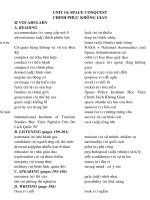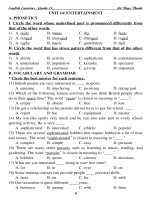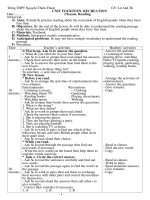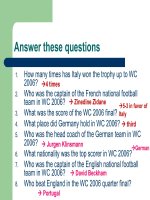Unit 14: Recreation
Bạn đang xem bản rút gọn của tài liệu. Xem và tải ngay bản đầy đủ của tài liệu tại đây (1.42 MB, 13 trang )
What
are
they
doing?
“All work and no play makes Jack a dull boy”, goes an English saying.
Recreation and entertainment are important to people everywhere in the world.
However, forms of popular entertainment are different in different countries.
In Britain, the most common leisure activities are home based. Watching
television is by far the most popular pastime, and nearly all households have a
television set. Over 51 percent of households have two or more television sets
and average viewing time for the population aged four and over is 25 hours a
week. Other pursuits include listening to music, reading, do-it-yourself home
improvements, and gardening.
British people are also very interested in watching and taking part in sports.
Walking and swimming are the two most popular sporting activities, being
almost equally undertaken be men and women. Snookers, pool and darts are
the next most popular sports among men. The most popular spectator sports
are football and rugby in winter, and cricket and athletics in summer.
In the last few years in Britain, a new trend has been developing, i.e., taking
weekend or holiday courses. There is a enormous range of courses on offer.
The course can be as simple as bricklaying or as sophisticated as making your
own stock market decisions. For people who are interested in art, there are
courses in painting or drawing. People who like music can take a course in
karaoke singing. Courses like shoemaking or glass engraving provide people
with practical skills they can do with hands. Those who want to improve their
minds can take a course of “Living with more meaning”. Entry qualifications to
weekend courses are generous, that is, generally no qualifications are
necessary, apart from an ability to pay the fees, which may be quite high.
NEW WORDS AND PHRASES
-Leisure (n): giải trí, thời gian rãnh
Ex: In her leisure time, she visits museums and galleries.
-Recreation (n): thú tiêu khiển
-Household (n): hộ gia đình
-Average( n): trung bình
Ex: The average of 3, 8 and 10 is 7.
-Pursue (v):_Pursuit (n): sở thích
Ex: My pursuits include listening to music, reading, and gardening.
-Undertake (v) :(undertook – undertaken)tham gia
-Sophisticated (a):phức tạp
Ex: a play that will only appeal to sophisticated audience.
Entry qualification (n.p): entry procedures
-trend (n): xu hướng
-stock market (n) : thị trường chứng khoáng
Task 1:
1.The activities are home based. They are organised .......
A. at home
B. outdoors
C. In the basement of the house.
2. Television viewing is by far the most popular pastime. This mean .......
A. People have to go very far to watch television.
B. television viewing is much more popular than any other pastime.
C. television viewing is as popular as other pastime.
3. There are many different courses on offer. This means .......
A. there are many different courses on television.
B. there are many different courses to be taken.
C. there are many different courses that teach people to make offers.









